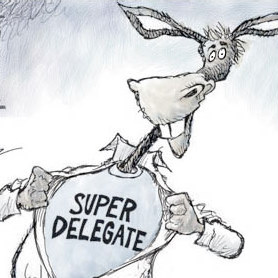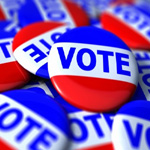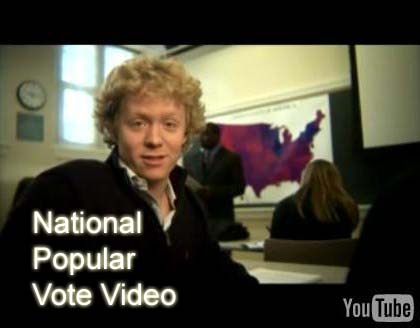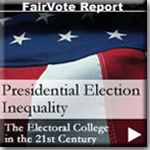|
Everyone's vote should be equal when electing the president, no matter where they live. FairVote is a leader in the campaign to establish a national popular vote for president, and recommends that political parties establish a schedule and rules to promote all states having a meaningful vote in nomination contests.
Major Parties Move to Reform Presidential Nomination Process
 The Republican and Democratic parties have been taking encouraging steps toward reforming the way presidential candidates are nominated. The Hill reported in June that the Republican National Committee is engaging in internal deliberations—as well as talks with their Democratic counterparts—on adjusting the nomination calendar so that more voters get a chance to have a substantive say in who becomes the party standard-bearer. Meanwhile, the Democrat Party is trying to avoid the frontloading chaos of the 2008 contest, attempting to impose some order on the scheduling of states’ primaries and caucuses, as well as reexamining the role of superdelegates. This week, FairVote’s Innovative Analysis takes a fresh look at reforming the nomination process, by suggesting that we add to the debate a system in which well-ordered state-by-state contests culminate in a final, decisive national primary day. Links
|
Connecticut House Passes NPV
Becomes 28th State Legislature to Approve National Popular Vote for President
 The Connecticut House of Representatives yesterday narrowly
approved the state’s entry into the National Popular Vote plan. The
bill must now pass the state senate and win the signature of the governor. If
that happens, Connecticut would join the other member states in agreeing to
allocate all of its electoral votes to the winner of the
national popular vote, neutralizing the undemocratic Electoral College system.
So far, the agreement has been passed in Hawaii, Illinois, Maryland, and New
Jersey, and just last week, Washington State. Connecticut’s addition of 7 electoral votes would give
the plan 68, over a quarter of the way toward the required 270. State Rep. Thomas Drew hit the nail on the head when he told
the Connecticut Postthat the Electoral College “actually distorts democracy,” and Rep. James F.
Spallone noted that moving to direct election of the president would “enhance
confidence, participation and excitement in small states and big states alike.” Local Coverage: [Blog post on the bill's passage]
[FairVote's
FAQ on NPV & Direct Election of the President]
[National Popular Vote homepage]
|
Washington State Enacts NPV
 On April, 28, Washington Governor Christine Gregoire signed National Popular Vote (NPV) legislation, making Washington the 5th state after Hawaii, Illinois, Maryland, and New Jersey to sign the legislation. These five states have a total of 61 electoral votes, just less than a quarter of the 270 electoral votes needed to bring the compact into effect. 27 state legislative chambers in 17 states have passed the NPV plan, including Arkansas, Colorado, Michigan, Nevada, New Mexico, Oregon, and Vermont most recently. Introduced in 48 legislatures since its launch in 2006, the bill has earned the support of more than 1650 state representatives. Recent polls indicate more than 70% of voters across a full range of states support a national popular vote of the president. [The Olympian Article on WA Passing NPV][ Longview Daily News and Columbian Editorials on NPV] [FairVote's FAQ on NPV & Direct Election of the President][Rob Richie’s Blog Post][National Popular Vote]
|
New Report Highlights FairVote Reforms
Barriers to Participation Exist, Despite High Turnout
 A new report by the Nonprofit Voter Engagement Network, titled, “America Goes to the Polls: A Report on Voter Turnout in the 2008 Election,” highlights the need for several FairVote reforms, including a national popular vote for president, greater uniformity in election administration, instant runoff voting, and universal voter registration. The authors recommend setting federal standards for running elections, introducing ranked choice voting to promote competition and implementing automatic voter registration, where Election Day Registration is a national standard. The report cites FairVote’s “Shrinking Battleground” series that tracks campaign visits and spending throughout the 2008 election cycle, concluding, “the winner-take-all and balkanized dynamics of the Electoral College have a negative impact on voter turnout.” In the forward, George Mason University Professor and Brookings Fellow, Dr. Michael P. McDonald, writes, “a national popular vote for president may hold the key to further increasing American voter participation.” [America Goes to the Polls][FairVote’s Shrinking Battleground][National Popular Vote for President][Professor McDonald’s U.S. Elections Project]
|
[ Next ]
|



August 10th 2009Commentary: A cure for the political nomination processCleveland Plain Dealer FairVote's Rob Richie and Paul Fidalgo offer a way to give everyone a say in presidential nominations while retaining the valuable state-by-state evaluation process. This piece also ran in McClatchy's newswire. July 13th 2009Albatross of U.S. democracyIndianapolis Star FairVote research is cited in support of the National Popular Vote plan in Indiana, because "every vote cast for president should be equally important and equally coveted, whether it originates in California, Connecticut or Crawfordsville." July 9th 2009Winner-take-all can elect a second-place presidentSan Diego Union-Tribune The founder of National Popular Vote lays out the shortcomings and injustices of the Electoral College system, and shows why the National Popular Vote plan is the right solution. May 17th 2009Why states should adopt the National Popular Vote plan for presidentSan Diego Union-Tribune FairVote's Rob Richie writes that the Electoral College deepens political inequality, and explains why the National Popular Vote plan is our best opportunity to ensure that every vote for president is equally valued. May 14th 2009Let's Make Every Vote Count The Nation Katrina vanden Heuvel, editor of the Nation magazine, highlights FairVote's research in an important piece on the "broad support" growing in the states for the National Popular Vote plan to elect the president.
|
 The Republican and Democratic parties have been taking encouraging steps toward reforming the way presidential candidates are nominated. The Hill reported in June that the Republican National Committee is engaging in internal deliberations—as well as talks with their Democratic counterparts—on adjusting the nomination calendar so that more voters get a chance to have a substantive say in who becomes the party standard-bearer. Meanwhile, the Democrat Party is trying to avoid the frontloading chaos of the 2008 contest, attempting to impose some order on the scheduling of states’ primaries and caucuses, as well as reexamining the role of superdelegates.
The Republican and Democratic parties have been taking encouraging steps toward reforming the way presidential candidates are nominated. The Hill reported in June that the Republican National Committee is engaging in internal deliberations—as well as talks with their Democratic counterparts—on adjusting the nomination calendar so that more voters get a chance to have a substantive say in who becomes the party standard-bearer. Meanwhile, the Democrat Party is trying to avoid the frontloading chaos of the 2008 contest, attempting to impose some order on the scheduling of states’ primaries and caucuses, as well as reexamining the role of superdelegates. The Connecticut House of Representatives yesterday narrowly
approved the state’s entry into the National Popular Vote plan. The
bill must now pass the state senate and win the signature of the governor. If
that happens, Connecticut would join the other member states in agreeing to
allocate all of its electoral votes to the winner of the
national popular vote, neutralizing the undemocratic Electoral College system.
So far, the agreement has been passed in Hawaii, Illinois, Maryland, and New
Jersey, and just last week, Washington State. Connecticut’s addition of 7 electoral votes would give
the plan 68, over a quarter of the way toward the required 270.
The Connecticut House of Representatives yesterday narrowly
approved the state’s entry into the National Popular Vote plan. The
bill must now pass the state senate and win the signature of the governor. If
that happens, Connecticut would join the other member states in agreeing to
allocate all of its electoral votes to the winner of the
national popular vote, neutralizing the undemocratic Electoral College system.
So far, the agreement has been passed in Hawaii, Illinois, Maryland, and New
Jersey, and just last week, Washington State. Connecticut’s addition of 7 electoral votes would give
the plan 68, over a quarter of the way toward the required 270. On April, 28, Washington Governor Christine Gregoire signed National Popular Vote (NPV) legislation, making Washington the 5th state after Hawaii, Illinois, Maryland, and New Jersey to sign the legislation. These five states have a total of 61 electoral votes, just less than a quarter of the 270 electoral votes needed to bring the compact into effect.
On April, 28, Washington Governor Christine Gregoire signed National Popular Vote (NPV) legislation, making Washington the 5th state after Hawaii, Illinois, Maryland, and New Jersey to sign the legislation. These five states have a total of 61 electoral votes, just less than a quarter of the 270 electoral votes needed to bring the compact into effect. A new report by the Nonprofit Voter Engagement Network, titled, “America Goes to the Polls: A Report on Voter Turnout in the 2008 Election,” highlights the need for several FairVote reforms, including a national popular vote for president, greater uniformity in election administration, instant runoff voting, and universal voter registration. The authors recommend setting federal standards for running elections, introducing ranked choice voting to promote competition and implementing automatic voter registration, where Election Day Registration is a national standard. The report cites FairVote’s “Shrinking Battleground” series that tracks campaign visits and spending throughout the 2008 election cycle, concluding, “the winner-take-all and balkanized dynamics of the Electoral College have a negative impact on voter turnout.” In the forward, George Mason University Professor and Brookings Fellow, Dr. Michael P. McDonald, writes, “a national popular vote for president may hold the key to further increasing American voter participation.”
A new report by the Nonprofit Voter Engagement Network, titled, “America Goes to the Polls: A Report on Voter Turnout in the 2008 Election,” highlights the need for several FairVote reforms, including a national popular vote for president, greater uniformity in election administration, instant runoff voting, and universal voter registration. The authors recommend setting federal standards for running elections, introducing ranked choice voting to promote competition and implementing automatic voter registration, where Election Day Registration is a national standard. The report cites FairVote’s “Shrinking Battleground” series that tracks campaign visits and spending throughout the 2008 election cycle, concluding, “the winner-take-all and balkanized dynamics of the Electoral College have a negative impact on voter turnout.” In the forward, George Mason University Professor and Brookings Fellow, Dr. Michael P. McDonald, writes, “a national popular vote for president may hold the key to further increasing American voter participation.”

